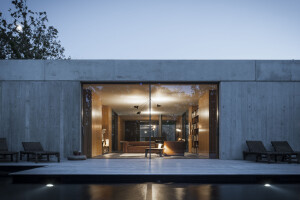Inspired by our experience exploring granite quarries in Guilford and Stony Creek along the Connecticut coast, the Bruce Museum draws inspiration from geology, a subject that has a rich history of scientific and technical exploration that has inspired many artists. The Bruce is conceived of as a stone monolith that is carved and excavated to create a monument that celebrates the geology of the site and its impact in shaping the culture of Connecticut, as well as creating a repository for exploring the complex relationships between art and science. The project is a renovation and addition to the existing structure, a private residence originally constructed in the 1850’s but subsequently expanded and renovated numerous times, and the addition of a 42,000 square foot new wing providing expanded collection storage, permanent and changing art gallery space, and a new public entrance lobby and lecture hall for the museum.
The Bruce Museum, with its art and science galleries physically adjacent to one another and all under one roof, affords visitors the opportunity to easily move from one content gallery to another. This spatial arrangement offers opportunities that, from a curatorial aspect, more easily allow art and science exhibits to connect with and draw meaning from one another in a mutually supportive manner that can enhance understanding and learning. Our interest in this expansion for the Bruce Museum is drawn from a longstanding belief that art and architecture play an essential role in enriching the lives of those who experience them. Many of the artists that have provided inspiration for our own work have explored this intersection of art and science: Walter de Maria’s Lightning Field, Nancy Holt’s SunTunnels, and James Turrell’s installations at Roden Crater, to name a few. All utilize their art to intensify experience as they reveal often unseen phenomena of science in visceral, powerful ways.
The façade is simultaneously reminiscent of the stone fences built by New England farmers as they cleared their fields of rocks and boulders. As these differently sized and shaped stones were randomly stacked together, the resulting openness led to them being referred to as “lace walls.” The design uses this treatment in various interventions to introduce diffuse natural light where desired for maximum effect.
The intersection of art and science at the Bruce Museum offers us a powerful educational model—one that actively engages in the design and delivery of experiences that have the power to inspire and change the way people see the world as well as the possibility of their own lives—awakening us to, as Heidegger states, “the magic of experience.”






















